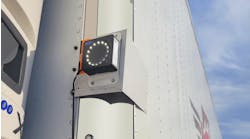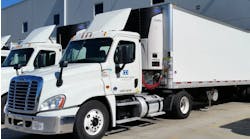The Lease vs. Own Dilemma: What’s right for your operation?
When it comes to trucks and product distribution, those in the food industry have three choices: use a carrier (for-hire or dedicated), buy a fleet, or lease a fleet.
Each has its pluses, but what’s right for your operation? According to Chuck Davis, PACCAR Leasing’s director of sales, much of the decision comes down to the regularity and volume of shipments, coupled with how much control a company wants over its fleet.
“The first step is to determine if you really need a private fleet by asking yourself the following questions,” Davis advises. “How important is it that my product arrive on time? Is my product perishable? Can I trust my operation with someone who isn’t familiar with my product, or my reputation with someone who doesn’t know my customers?”
While most trucking firms are reputable, in some cases, Davis says product moves on their schedule rather than the shipper’s schedule. “And their drivers are not likely to know your products, routes or customers. So if on-time delivery, and putting a face with your company isn’t critical, the trucking company option may be right for you. If, however, control of shipping is paramount to your operation and you ship often, your best option is to have direct control of your transportation, and that means either owning or leasing equipment.”
According to a National Private Truck Council (NPTC) 2020 Survey, the top reasons companies operate a private fleet are customer service (by an almost 2-to-1 margin), followed by cost, capacity and control. The survey also showed that those companies measure customer service through on-time deliveries with performance windows from just 10 minutes, up to 60 minutes.
Purchase or lease?
Today, according to Davis, more private fleets are transitioning to full-service leasing and the NPTC survey supports that finding. A high percentage of food and beverage companies include some level of leasing in their fleet strategy.
“Many of our customers will tell you that they were staunch advocates of owning and maintaining their own fleet, but they’ve changed their stance over the years,” Davis said. “Food and beverage tends to be a very personal industry and the thought of losing any control is troubling for them. However, once they see all the possibilities of leasing, they recognize it can be a competitive advantage.”
According to Davis, there are three primary considerations to keep in mind when making a lease vs. buy decision: Financial resources, the size and complexity of the fleet, and the geographic range of the operation.
“As a rule of thumb, if the purchase cost of your vehicles will hinder the growth of your primary business, it’s probably a good idea to consider leasing to protect your capital,” Davis said. “A primary goal of all companies is to obtain the best financial return on their money, which includes acquiring a single vehicle or a fleet of trucks. With leasing, you’re paying for the use of the vehicle, and since you don’t own the vehicle, the residual value is backed out. The monthly cost is less than if you financed in ownership. The most recent development in the U.S. Financial Accounting Standards Board’s ASC 842 that requires all leases be on-balance sheet, which has been in effect for public companies starting 2019, has a proposal to extend the effective date for private companies from 2020 to 2021. While there is some related administration burden in the beginning, it will become business as usual and leasing remains attractive since the amounts capitalized will be significantly lower than in ownership. The asset investment decision is one of the most important decisions a company can make, so financial officers really should be involved.
“The second consideration—size and complexity of the fleet—centers around customized specifications and anticipated maintenance costs, including the significant expense of technicians, service facilities and tooling if you operate your own shop. Generally speaking, if you run a small- to medium-sized fleet, leasing is often the most cost-effective alternative since you’ll bypass these expenses. However, if your fleet is large enough to justify the expenses of your own maintenance facility, other considerations may or may not make full-service leasing the most economical solution. Your decision will require a thorough financial analysis, ideally performed by an outside consultant familiar with all the costs—tangible and intangible—of running a truck fleet. Keep in mind that while today’s modern, high-tech trucks are very efficient on the road, they require a modernized maintenance facility with specialized diagnostic equipment, as well as thoroughly trained and certified technicians.”
While the shortened development cycle of new technology is delivering significant improvement in truck performance and fuel efficiency, it comes at a cost of tooling, training and hiring technicians with new skill sets. “Environmental strategies are a growing element of company responsibility and management of fluids and other regulated components must be monitored to avoid spills or leaks as well as maintain compliance,” Davis added.
“Once you have a full understanding of your maintenance shop, we recommend doing a Pro Forma, which identifies all the cost of operating a maintenance facility – it’s something PacLease and other leasing companies do on a regular basis. The numbers will help you decide the best way to go.”
According to Davis, the range of a fleet’s operation can also have a major impact on the lease vs. buy decision. “For instance, many of our customers lease more than 30 vehicles,” he said. “For them, leasing is more economical because they distribute in a multi-state operation. A service bay 1,000 miles away won’t help a stranded truck. Many leasing companies have emergency roadside service programs to provide repairs anywhere in the country, 24 hours a day. Owning and operating trucks can be a very expensive proposition when you factor in the frequency of breakdowns and subsequent repairs. Leasing eliminates this worry by taking lease customers off the hook for these expenses, giving them the advantage of a reliable, high-performing fleet, as well as accurate cost accounting. And, unlike ownership, the lease customer can accurately budget for transportation expenses over the term of the lease.”
Full-service lease
For people accustomed to automotive leasing, full-service truck leasing is something altogether different. Whereas automotive leasing generally stops with the financial arrangements, full-service truck leasing typically includes a myriad of services, such as access to product engineers, full preventive maintenance support, emergency roadside service, ELD solutions, driver safety and fuel programs, as well as financing. In addition, a full-service leasing company can handle all the paperwork that can monopolize a manager’s time—fuel tax reporting, toll-management, licensing and permitting.
Choosing a lessor
Choosing the right leasing company to work with is an important decision. You are, in effect, entering into a long-term relationship (typically three to six years) that should be beneficial to both parties.
“Leasing a truck is a bit like buying a suit,” Davis said. “You can either buy it off the rack or have it custom tailored. While the suit off the rack may appear to be less expensive, you’ll probably be happier with the custom-tailored suit down the road. You’ll also enjoy a more professional image with a suit designed specifically with you in mind.
“Look for lease companies that are willing to ‘tailor’ a lease to meet your specific transportation needs. Do you have specific load or route requirements that can be best met with a custom-spec’d vehicle? Would premium vehicles, like a Kenworth or Peterbilt, enhance your company’s image? Do you need assistance with fuel tax reporting, permits or licensing? Do you need a proven driver safety program?
“It’s important for your lease sales representative to clearly understand your transportation requirements and business needs. Only then can they become a transportation partner.”
Finally, Davis says a good leasing company will provide objective lease vs. ownership comparisons, including operating and financial analyses that includes a net present value of cash flows. “This comparison should include your company’s own numbers for the ownership option (labor, facilities, maintenance costs, cost of borrowing, etc.). It will give you the means to weigh the tangible financial benefits and the intangible operating benefits that full-service truck leasing offers versus ownership.”
In today’s business environment, a company’s emphasis, both strategically and operationally, should be focused on its core business. The answer to the transportation dilemma is never the same for any two companies. By carefully examining needs and reviewing the benefits of using trucking firms, purchasing trucks or leasing them, you’ll reach the most cost-efficient solution for your business.



